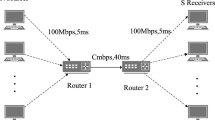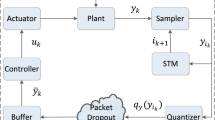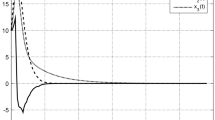Abstract
The adaptive predefined settling time performance tracking control for a class of uncertain nonlinear network systems with fast time-varying or even abrupt reference signals is studied. In this paper, an improved performance function with time-varying boundary (following the change of reference signal) is designed to overcome the problem that the traditional prescribed performance control (PPC) can only converge to a constant in steady state. Compared with the existing adaptive finite time prescribed performance congestion control for tracking fixed value reference signals, an adaptive predefined settling time prescribed performance congestion control strategy is proposed by means of some new recursive construction (introducing nonautonomous differential equations (NDE)) and analysis innovation. In addition, the network system considered in this paper is more general. Under the framework of backstepping, NDE is used iteratively to control the approximation error with boundary inequality. It is proved theoretically that all signals of the closed-loop system are predefined settling time bounded. Finally, the effectiveness of the proposed control strategy is verified by simulations.














Similar content being viewed by others
Explore related subjects
Discover the latest articles, news and stories from top researchers in related subjects.Data availability
The data that support the findings of this study are available from the corresponding author upon reasonable request.
References
Floyd S, Jacobson V (1993) Random early detection gateways for congestion avoidance. IEEE/ACM Trans Network 1(4):397–413
Misra V, Gong WB, Towsley D (2000) Fluid-based analysis of a network of aqm routers supporting tcp flows with an application to red. Proc ACM/SIGCOMM 30(4):151–160
Liu S, Basar T, Srikant R (2005) Exponential-red: a stabilizing aqm scheme for low-and high-speed tcp protocols. IEEE/ACM Trans Network 13(5):1068–1081
Kim KB (2006) Design of feedback controls supporting tcp based on the state-space approach. IEEE Trans Autom Contr 51(7):1086–1099
Wang LJ, Cai L, Liu XZ, Shen XM (2007) Stability and tcp-friendliness of aimd/red systems with feedback delays. Comput Netw 51:4475–4491
Sheikhan M, Shahnazi R, Hemmati E (2013) Adaptive active queue management controller for tcp communication networks using pso-rbf models. Neural Comput Appl 22:933–945
Wang K, Jing YW, Liu Y, Liu XP, Dimirovski GM (2020) Adaptive finite-time congestion controller design of tcp/aqm systems based on neural network and funnel control. Neural Comput Appl 32:9471–9478
Wang K, Liu XP, Jing YW (2022) Super twisting sliding mode network congestion control based on disturbance observer. Neural Comput Appl 34:9689–9699
Liu Y, Liu XP, Jing YW, Zhou SW (2018) Adaptive backstepping \({H_\infty }\) tracking control with prescribed performance for internet congestion. ISA Trans 72:92–99
Shen JD, Jing WY, Ren T, Bai Y (2022) Observer-based finite-time congestion control for tcp/aqm network system with time-varying delays and udp flows. Asian J Contr 24(6):3231–3239
Wang K, Liu XP, Jing YW (2021) Command filtered finite-time control for nonlinear systems with state constraints and its application to tcp network. Inform Sci 550:189–206
Bhat SP, Bernstein DS (1998) Continuous finite-time stabilization of the translational and rotational double integrators. IEEE Trans Autom Contr 43(5):678–682
Hong YG, Wang JK, Cheng DZ (2022) Adaptive finite-time control of nonlinear systems with parametric uncertainty. IEEE Trans Autom Contr 51(5):858–862
Bao J, Wang H, Liu PX, Cheng C (2021) Fuzzy finite-time tracking control for a class of nonaffine nonlinear systems with unknown dead zones. IEEE Trans Syst Man Cybern Syst 51(1):452–463
Wei W, Zhang W (2022) Command-filter-based adaptive fuzzy finite-time output feedback control for state-constrained nonlinear systems with input saturation. IEEE Trans Fuzzy Syst 30(10):4044–4056
Wang F, Chen B, Liu X, Lin C (2018) Finite-time adaptive fuzzy tracking control design for nonlinear systems. IEEE Trans Fuzzy Syst 26(3):1207–1216
Polyakov A (2012) Nonlinear feedback design for fixed-time stabilization of linear control systems. IEEE Trans Autom Contr 57(8):2106–2110
Wei R, Cao J, Kurths J (2021) Fixed-time output synchronization of coupled reaction-diffusion neural networks with delayed output couplings. IEEE Trans Netw Sci Eng 8(1):780–789
Lu K, Liu Z, Yu H, Chen CLP, Zhang Y (2022) Adaptive fuzzy inverse optimal fixed-time control of uncertain nonlinear systems. IEEE Trans Fuzzy Syst 30(9):3857–3868
Chen M, Wang H, Liu X (2021) Adaptive fuzzy practical fixed-time tracking control of nonlinear systems. IEEE Trans Fuzzy Syst 29(3):664–673
Sun Y, Wang F, Liu Z, Zhang Y, Chen CLP (2022) Fixed-time fuzzy control for a class of nonlinear systems. IEEE Trans Cybern 52(5):3880–3887
Pal AK, Kamal S et al (2019) Design of controllers with arbitrary convergence time. Automatica 112:108710
Pal AK, Kamal S, Yu X, Nagar SK, Bandyopadhyay B (2022) Free-will arbitrary time terminal sliding mode control. IEEE Trans Circu Syst II Exp Br 69(7):3189–3193
Yang Y, Hua C, Li J (2022) A novel interaction controller design for robotic manipulators with arbitrary convergence time. IEEE Trans Circu Syst II Exp Br 69(4):2151–2155
Li ZH, Chen XY, Ding SH, Liu Y, Qiu JL (2020) Tcp/awm network congestion algorithm with funnel control and arbitrary setting time. Appl Math Computat 85:125410
Qi XL, Ma HJ, Jing YW (2022) A novel congestion controller with prescribed settling time for tcp/aqm network system. IEEE Trans Netw Sci Eng 9(6):4065–4074
Bechlioulis CP, Rovithakis GA (2008) Prescribed performance adaptive control of siso feedback linearizable systems with disturbances. 16th Mediterranean conference on control and automation, pp 1035–1040
Wang YY, Hu JB, Li J, Liu BQ (2019) Improved prescribed performance control for nonaffine pure-feedback systems with input saturation. Int J Robust Nonl Contr 29(6):1769–1788
Wang YY, Hu JB (2018) Improved prescribed performance control for air-breathing hypersonic vehicles with unknown deadzone input nonlinearity. ISA Trans 79:95–107
Liu Y, Jing YW, Chen XY (2019) Adaptive neural practically finite-time congestion control for tcp/aqm network. Neurocomputing 351(25):26–32
Wang LX (1993) Stable adaptive fuzzy control of nonlinear systems. IEEE Trans Fuzzy Syst 1(2):146–155
Wang H, Bai W, Zhao X, Liu PX (2022) Finite-time-prescribed performance-based adaptive fuzzy control for strict-feedback nonlinear systems with dynamic uncertainty and actuator faults. IEEE Trans Cybern 52(7):6959–6971
Tong S, Li Y, Sui S (2016) Adaptive fuzzy tracking control design for siso uncertain nonstrict feedback nonlinear systems. IEEE Trans Fuzzy Syst 24(6):1441–1454
He S, Fang H, Zhang M, Liu F, Ding Z (2020) Adaptive optimal control for a class of nonlinear systems: the online policy iteration approach. IEEE Trans Neural Netw Learn Syst 31(2):549–558
Shen JD, Jing YW, Ren T (2022) Adaptive finite time congestion tracking control for TCP/AQM system with input-saturation. Int J Syst Sci 53:253–264
Acknowledgements
This work is supported by the National Nature Science Foundation of China under Grant (61873306).
Author information
Authors and Affiliations
Corresponding author
Ethics declarations
Conflict of interest
The authors declare that there is no conflict of interest regarding the publication of this work.
Additional information
Publisher's Note
Springer Nature remains neutral with regard to jurisdictional claims in published maps and institutional affiliations.
Proof of Theorem 1
Proof of Theorem 1
Proof. Let \(\ell = {\kappa _1}(\zeta )\), then \({\kappa _2}(\Psi ) < \ell \) and \({\kappa _2}(\left\| {x({t_0})} \right\| ) \le \ell \). Let \(\Upsilon = {\kappa _2}(\Psi )\) and define \({\Xi _{t,\Upsilon }} = \{ x \in {{\Omega _\zeta }}\vert V(t,x) \le \Upsilon \} \) and \({\Xi _{t,\ell }} = \{ x \in {\Omega _\zeta }\vert V(t,x) \le \ell \} \), then \({\Omega _\Psi } \subset {\Xi _{t,\Upsilon }} \subset \{ {\kappa _1}\left\| x \right\| \le \Upsilon \} \subset \{ {\kappa _1}\left\| x \right\| \le \ell \} = {\Omega _\zeta } \subset D\) and \({\Xi _{t,\Upsilon }} \subset {\Xi _{t,\ell }} \subset {\Omega _\zeta } \subset D\). The sets \({\Xi _{t,\ell }}\) and \({\Xi _{t,\Upsilon }}\) own the property that a solution starting in either set cannot leave it because \(\dot{V}(t,x)<0\) is on the boundary. Since \({\kappa _2}(\left\| {x({t_0})} \right\| ) \le \ell \Rightarrow x({t_0}) \in {\Xi _{{t_0},\ell }}\), it can show that \(x(t) \in {\Xi _{t,\ell }}\) for \(\forall t \ge {t_0}\). A solution starts in \({\Xi _{t,\ell }}\) and must go into \({\Xi _{t,\Upsilon }}\) in predefined time since in \(\{ {\Xi _{t,\ell }} - {\Xi _{t,\Upsilon }}\} \), \({\dot{V}}\) satisfies
Then, inequality (A1) insinuates that
where \(\upsilon = {\rho _0}{e^{\frac{{(\gamma - \varsigma ){{({t_f} - t)}^{\varpi + 1}}}}{{\varpi + 1}}}}\) and \({\rho _0} = ({e^{V({x_0})}} - 1){e^{ - \frac{{(\gamma - \varsigma ){{({t_f} - {t_0})}^{\varpi + 1}}}}{{\varpi + 1}}}}\), demonstrating that V(t, x(t)) decreases to \(\Upsilon \) within \(t \in [{t_0},\omega {t_f})\). For a solution starting inside \({\Xi _{t,\Upsilon }}\), \(\left\| {x(t)} \right\| \le k_1^{ - 1}({k_2}(\Psi )),\forall t \ge \omega {t_f}\) is satisfied for all \(t \ge {t_0}\) since \({\Xi _{t,\Upsilon }} \subset \{ {\kappa _1}(\left\| x \right\| ) \le {\kappa _2}(\Psi )\} \). For a solution starting inside \({\Xi _{t,\ell }}\), but it is outside \({\Xi _{t,\Upsilon }}\), let \(\omega {t_f}\) be the first time, this solution enters \({\Xi _{t,\Upsilon }}\), \(\forall t \in [{t_0},\omega {t_f})\), then
where \(\kappa = {\kappa _3} \circ \kappa _2^{ - 1}\) is a class K function defined on \([0,\zeta ]\). We assume that \(\kappa \) is locally Lipschitz without loss of generality. Also, \({\phi }\) meets the autonomous first-order differential equation, then
It can be demonstrated such a class KL function \(\hbar \) that
Defining \({\kappa _l}(\zeta ,\Im ) = \kappa _1^{ - 1}(\hbar ({\kappa _2}(\zeta ),\Im ))\), we obtain
Rights and permissions
Springer Nature or its licensor (e.g. a society or other partner) holds exclusive rights to this article under a publishing agreement with the author(s) or other rightsholder(s); author self-archiving of the accepted manuscript version of this article is solely governed by the terms of such publishing agreement and applicable law.
About this article
Cite this article
Qi, X., Li, C., Ni, W. et al. A novel adaptive fuzzy prescribed performance congestion control for network systems with predefined settling time. Neural Comput & Applic 36, 523–532 (2024). https://doi.org/10.1007/s00521-023-09022-w
Received:
Accepted:
Published:
Issue Date:
DOI: https://doi.org/10.1007/s00521-023-09022-w




